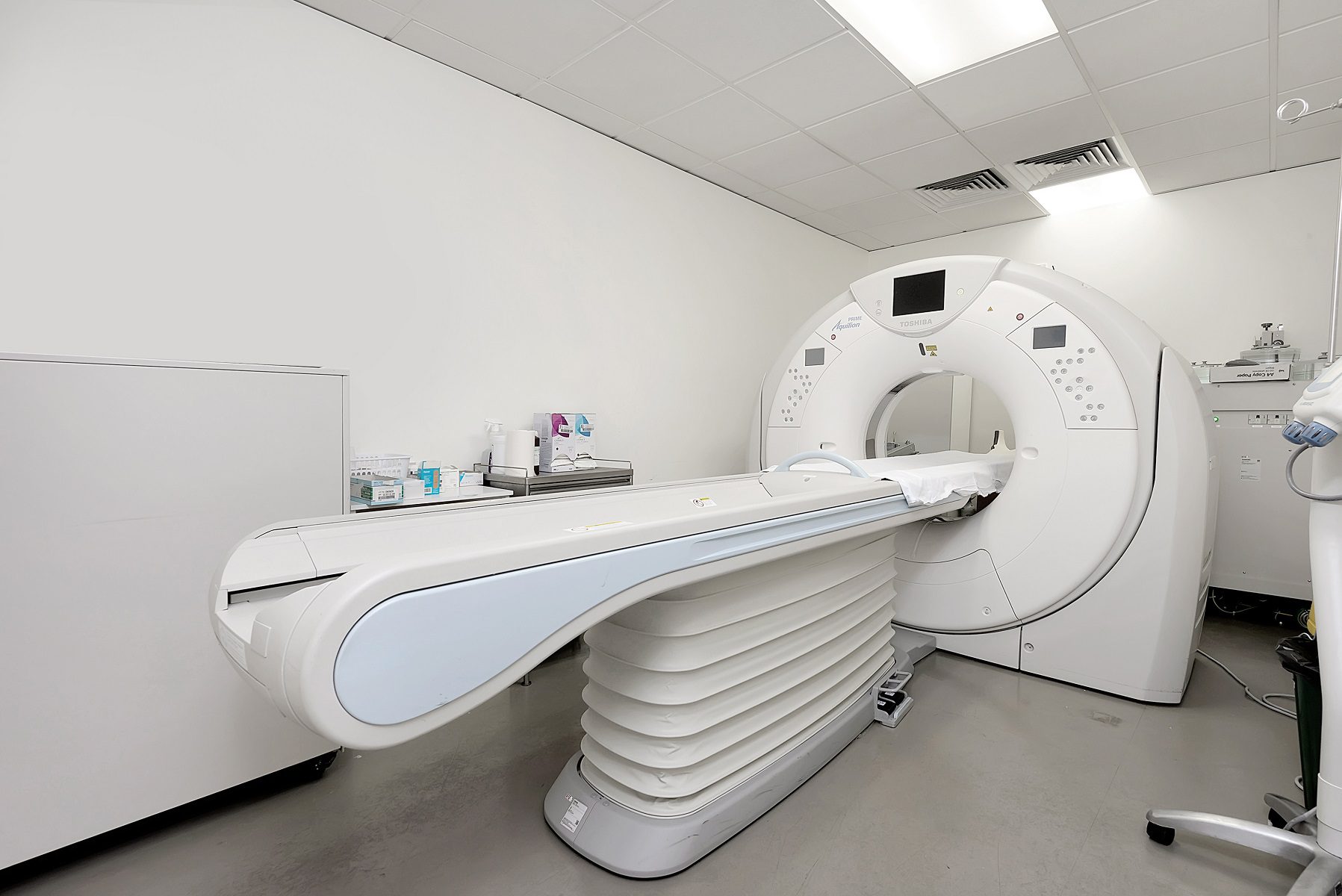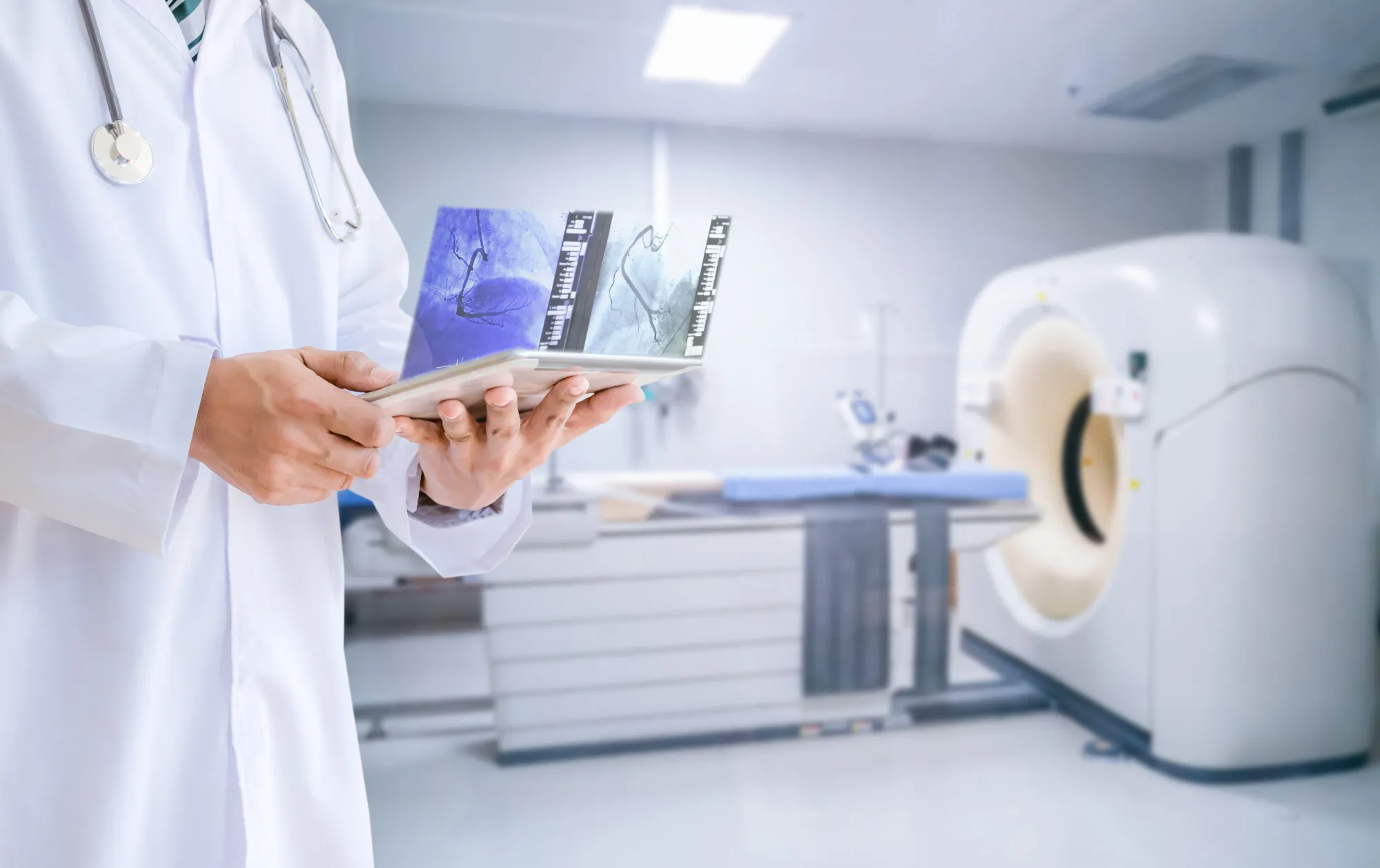What is a CT scan?
CT (Computed Tomography, also referred to as Computed Axial Tomography or CAT) scanning is a medical imaging technique that uses X-rays and sophisticated computer imaging to create detailed two- or three-dimensional images of what is happening inside your body. A CT scan can create an image of every type of body structure, including bone, blood vessels and soft tissue.
CT scanning produces cross-sectional images of any part of your body by passing low levels of X-ray radiation through the body. The radiation is produced by a shielded X-ray tube, mounted in a round gantry. AdelaideMRI now operates 160-slice, low-dose Toshiba CTs at each of our practice locations. The CT scan is a painless, non-invasive, and relatively safe procedure that requires no recovery time.

What are CT scans used for?
A CT scan can precisely detect structural abnormalities in the body. As such, doctors often order CT scans to assist with diagnosis of a health problem or to identify how well you have responded to treatment. CT scans provide more detailed images of more types of tissue than traditional X-rays do, which allows your doctor to detect and locate many potential medical conditions, including problems in the blood vessels.
How do I prepare for CT scan?
While preparation varies with the type of examination, most CT scans do not require any preparation. You may be asked to fast prior to your examination. Our friendly staff will advise you whether this applies to your scan when you make your appointment. Please review the next section for guidelines about fasting based on scan type. You are welcome to ask questions regarding your examination.
If you are on medications for diabetes, you may be asked to withhold your medications for up to 48 hours after the CT scan, or be re-booked for part of the scan on another day. If you are not sure if this applies to you, please ask us before the examination.
If you are pregnant, you must let our staff know prior to your CT scan.
Please bring your doctor’s CT scan request form, your Medicare card and any previous X-rays, scans, reports and films each time you visit us.
If it’s necessary, how much should I fast before a CT scan?
The following steps are offered as a general guideline. Our friendly staff will advise on your specific fasting process when you make your appointment.
- CT scan of the head, neck, chest: Eat nothing for two hours before your CT scan. You may drink a small amount of water. Continue all normal medications.
- CT angiogram: Avoid consuming coffee, tea or chocolate for eight hours before your CT scan.
- CT scan of the abdomen and pelvis: Avoid eating or drinking anything for four hours before your CT scan.
- CT scan of the abdomen (with colon views): Avoid eating or drinking anything for four hours before your CT scan.
- CT-guided injections and other CT scan examinations do not require any preparation. An injection of local anaesthetic is available for use with some injections, but you may refuse this.
What happens during a CT scan?
A standard CT examination takes anywhere from 15–60 minutes, which includes preparation, patient information confirmation, positioning and planning. The actual scan time for each acquisition is typically less than 10 seconds, but multiple acquisitions are required to build a map of internal structures.
During the CT scan, the patient lies on the scanner table with the part of the body to be examined positioned in the scanner’s gantry. The X-ray tube moves within the gantry on a circular rail, travelling around the central hole and the patient on the table. An arc-shaped band of detectors is positioned opposite the X-ray tube. As the tube and detectors rotate around with the gantry, these detectors record changes in the density of parts of the body as X-rays pass through them. You will not experience any discomfort from the radiation.
During the scan, the technician observe you at all times via a camera and two-way microphone built into the scanner. Patients also have a buzzer that allows them to communicate with our staff during the scanning process.
Depending on the area under examination, some patients may receive an intravenous injection of contrast material. The contrast can provide valuable information by highlighting certain organs and blood vessels on the CT images. Local anaesthetic is available prior to contrast injections, but is not mandatory, and patients should experience hardly any discomfort.
Is CT scanning a safe process?
CT scans briefly expose the patient to a small, targeted amount of ionising radiation, to help create an image of structures inside your body. While the intensity of X-rays used by a CT scanner is more than is used for a traditional X-ray examination, this low dose of radiation creates no reliably measurable increased risk of cancer or any other radiation-related injury. However, because of the potential for increased risk, X-ray imaging such as CT scans are only performed where there is a clear medical benefit. Also, during CT scans, the amount of radiation used is kept to the As Low As Reasonably Achievable (ALARA) standard that applies to all medical imaging.
CT scans – along with other medical imaging scans – are directly linked to longer life expectancy and declining cancer death rates as medical imaging is generally safer and more affordable than invasive procedures such as surgery. If your doctor recommends a CT scan, ask about the potential benefits to your health, which generally greatly outweigh any small potential risk from radiation.
While some patients can experience fear of confined spaces (claustrophobia), the CT room layout and décor is designed to minimise this. If you have any concerns about having an CT scan, please discuss these with our friendly staff before undergoing the process.
What sort of CT scanners does AdelaideMRI use?
AdelaideMRI has installed 160-slice low-dose Toshiba CT scanners to provide our patients with the highest quality imaging. All our CT scanners use raw data acquisition with a slice thickness of only 0.5 mm – the thinnest detector elements available in any commercial scanner sold in Australia. This means tiny structures inside the body, such as small blood vessels or the bones of the ear, can be accurately imaged. The industry-best low-contrast resolution creates consistent soft tissue imaging at the lowest achievable dose. The result is the best achievable imaging, coupled with the lowest achievable X-ray exposure.
The Toshiba 3-D Quantum ‘denoising’ system (patent-pending) enables us to reduce patient doses by as much as 40 per cent. Quantum de-noising gives us the choice of reducing dose without loss of image quality or improving image quality at our usual low dose settings. Importantly, the lowest suitable radiation dose is always used, including for paediatric imaging.
How much does a CT scan cost?
We bulk bill all Medicare-eligible CT scans as part of our commitment to providing affordable and accessible healthcare. Bulk billing means there is no gap payment and no unexpected out-of-pocket expense. Please check if your scan is Medicare-eligible when booking. The Medicare schedule has very specific guidelines about which examinations are eligible.
It is your choice where to have your CT scan. Call us for an appointment with any referring doctor’s imaging request form.
Sometimes your doctor may require traditional large-format plastic images (‘hard films’). If so, let us know and we will print plastic images for you – a small charge of $20 applies for these copies.
Fees apply where a CT scan is not Medicare-eligible. Please ask our reception staff when booking if you have questions about the eligibility of your scan.
What happens to my CT scan results?
Your scan results are treated with strict confidentiality. Our radiologist or technician will talk to you before, during and after the examination and explain the images being taken, but may not be able to provide precise information about your condition prior to the finalisation of a written report. A second radiologist may review your scan images. AdelaideMRI will issue your final report within the next 48 hours and send the results to your referring doctor as well as a digital copy of your images. As the images are digital, they are stored on our computer system for future reference. You should always discuss the results with your doctor.







